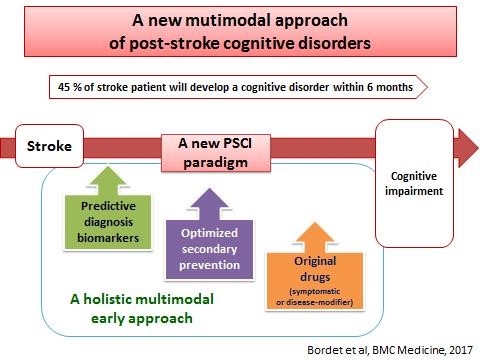Degenerative and vascular cognitive discorders

Presentation
This team, made up of clinical and pre-clinical researchers, is multidisciplinary. It is located at the interface between neurology, pharmacology and imaging. The research project is focused on the translational, transnosographic and multimodal study of cognitive disorders associated with degenerative processes or neurovascular lesions, starting from the observation that the mechanisms are entangled.
- COGNITIVE DISORDERS POST ISCHEMIC STROKE : PREDICTION, EVALUATION, PHARMACOLOGICAL APPROACH
Scientific and medical context
The occurrence of cognitive disorders after ischemic stroke is now well known. The objective of the project is to identify predictive factors for the occurrence of these cognitive disorders, including for mild strokes, and to characterize pharmacological approaches likely to prevent, improve or slow the evolution of these disorders. This project is conducted using a translational approach, combining animal models, cohort studies and interventional studies. The methodological tools combine biological markers, neuropsychological scales and brain imaging.

Team: Régis Bordet, Charlotte Cordonnier, Didier Leys, Dominique Deplanque, Hilde Hénon, Stéphanie Bombois, Thibaut Dondaine, Renault Lopes, Xavier Leclerc, Nacim Betrouni, Michèle Bastide, Maud Petrault, Thavarak Ouk, Cécile Bordier, Patrick Duriez, Christine Delmaire, Jean-Pierre Pruvo, Charlotte Laloux, Grégory Kuchcinski, Patrick Gelé
International Collaborations: M Dichgans (Munich), Consortium Strokog (Australie), Consortium VCI Map PSCI (Utrecht) réseau Strokavenir network
Industrial Collaborations: Theranexus, Metabrain Research, Qynapse, Axoltis, Kowa
Labels/ financements: PHRC, FUI, Industriel founding, Regional Council
Key achievements
- In collaboration with the team of Martin Dichgans (Munich), we were able to show that strokes, without major motor consequences, were accompanied in 45% of cases by the occurrence of a cognitive disorder at 6 months
- By combining an animal model and a cohort study, we have shown that at 6 months, the occurrence of a cognitive disorder was associated with an atrophy of the entorhinal cortex and a deformation of the hippocampus
- We identified a connectivity circuit that is altered in patients with poststroke cognitive impairment, and the evolutionary nature of this alteration at 3 years.
- We identified that hippocampal texture analysis, measured in MRI at 72 hours after stroke, can predict the development of post-stroke cognitive impairment.
- The STROKDEM cohort, which includes 200 patients followed up at 5 years, is a constituent cohort of several international consortia (Strokog, MICON, VCI map PSCI)
- One of the objectives of the CEOPS study is to investigate whether optimizing secondary stroke prevention has an impact on the development of cognitive impairment.
Publications
Lopes R, Bournonville C, Kuchcinski G, Dondaine T, Mendyk AM, Viard R & al , Prediction of Long-term Cognitive Functions after Minor Stroke, Using Functional Connectivity., Neurology, 2021
Betrouni N, Yasmina M, Bombois S, Pétrault M, Dondaine T, Lachaud C & al , Texture Features of Magnetic Resonance Images: an Early Marker of Post-stroke Cognitive Impairment., Transl Stroke Res, 2019
Zietemann V, Georgakis MK, Dondaine T, Müller C, Mendyk AM, Kopczak A & al , Early MoCA predicts long-term cognitive and functional outcome and mortality after stroke., Neurology, 2018
Bournonville C, Hénon H, Dondaine T, Delmaire C, Bombois S, Mendyk AM & al , Identification of a specific functional network altered in poststroke cognitive impairment., Neurology, 2018
Mendyk AM, Duhamel A, Bejot Y, Leys D, Derex L, Dereeper O & al , Controlled Education of patients after Stroke (CEOPS)-nurse-led multimodal and long-term interventional program involving a patient''s caregiver to optimize secondary prevention of stroke: study protocol for a randomized controlled trial, Trials, 2018
Delattre C, Bournonville C, Auger F, Lopes R, Delmaire C, Henon H & al , Hippocampal Deformations and Entorhinal Cortex Atrophy as an Anatomical Signature of Long-Term Cognitive Impairment: from the MCAO Rat Model to the Stroke Patient., Transl Stroke Res, 2017
Bordet R, Ihl R, Korczyn AD, Lanza G, Jansa J, Hoerr R & al , Towards the concept of disease-modifier in post-stroke or vascular cognitive impairment: a consensus report, BMC Med., 2017
